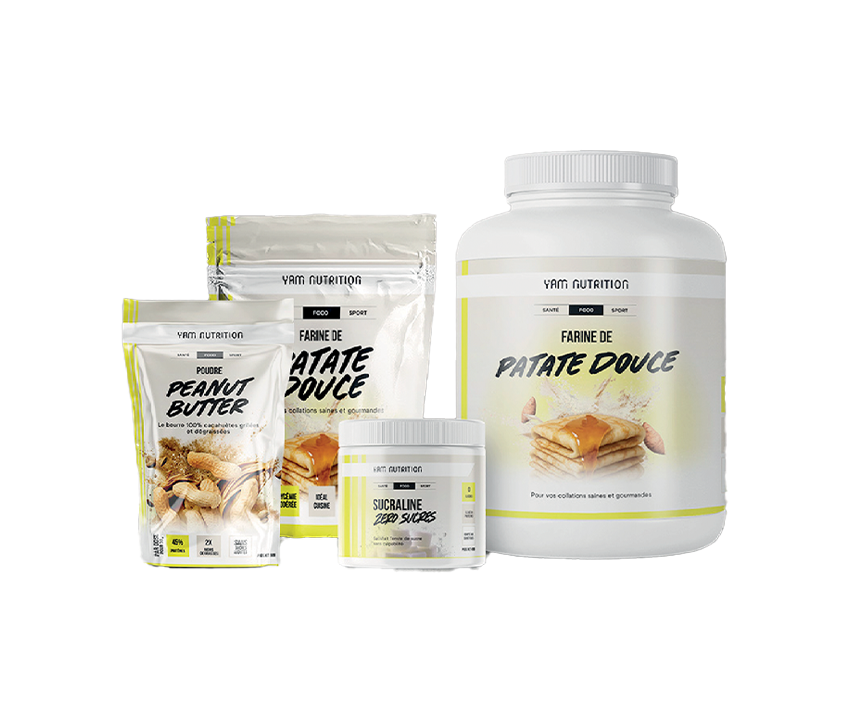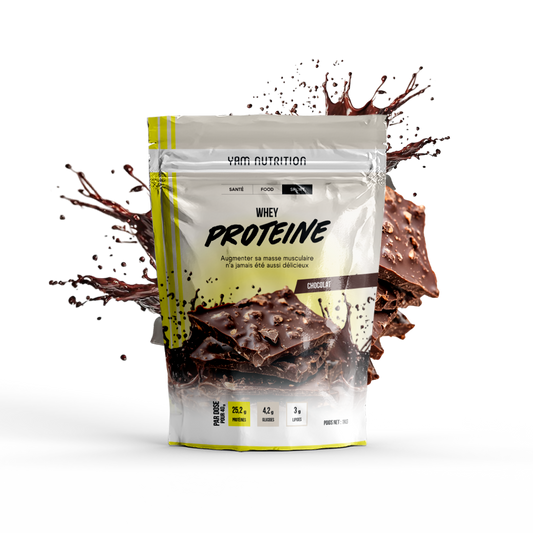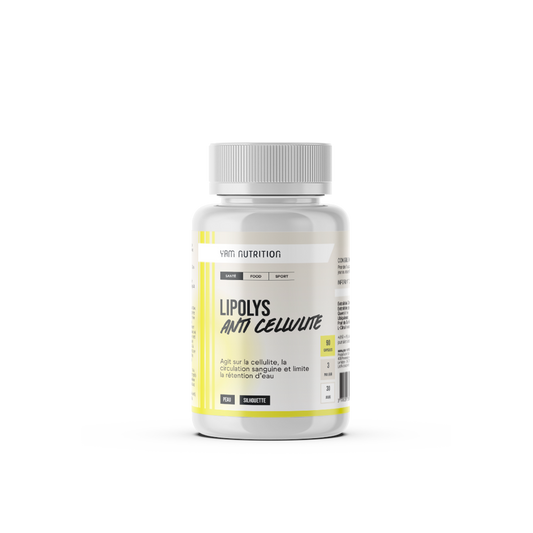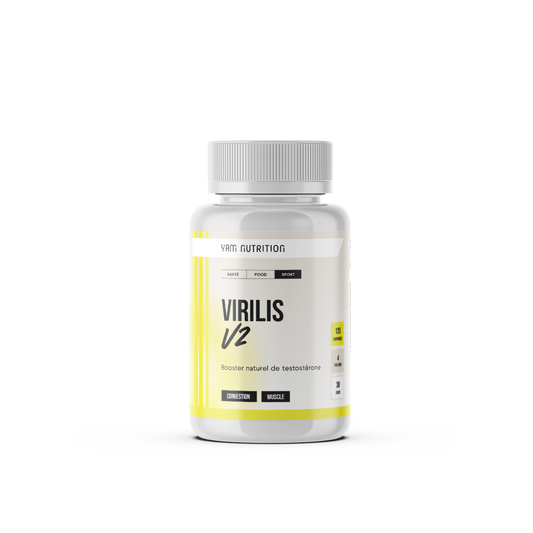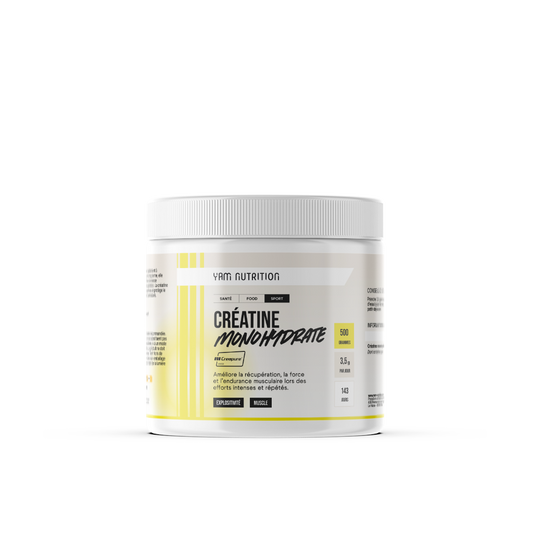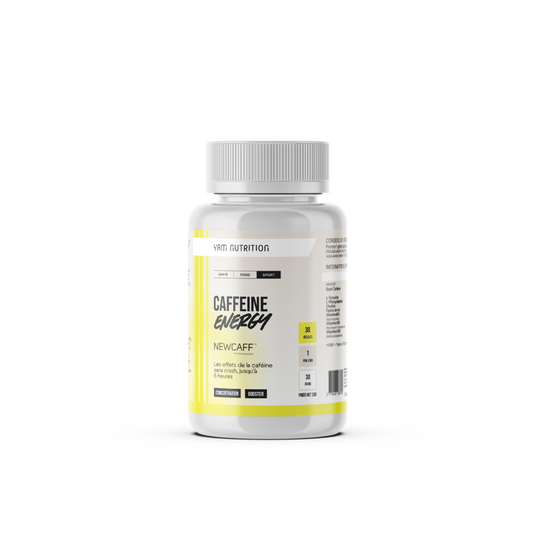Tribulus terrestris and testosterone, myth or reality?
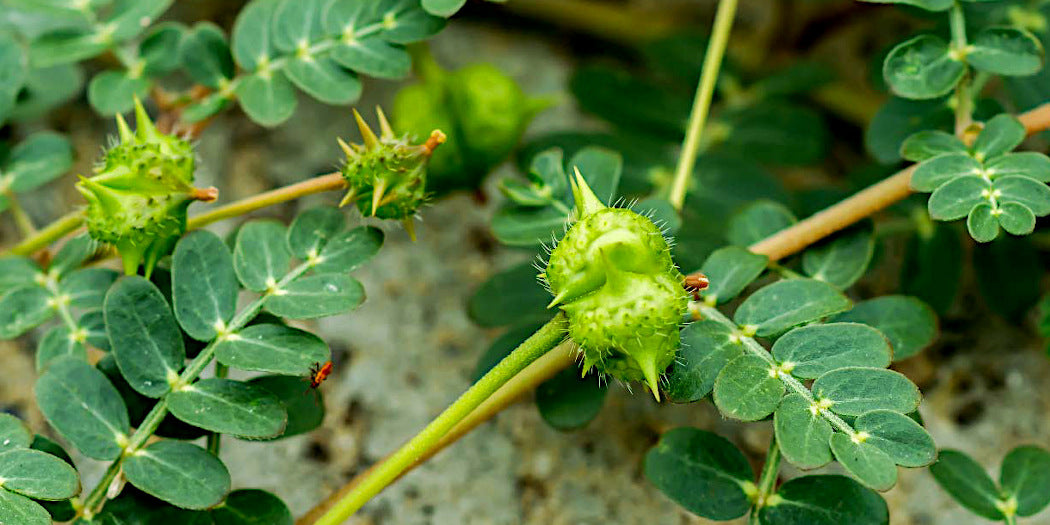
Sommaire
- The origin of the Tribulus terrestris myth, a somewhat incredible Bulgarian story...
- What are the effects of Tribulus terrestris?
- Tribulus terrestris is an endemic plant known in Ayurvedic medicine
- The myth of Bulgarian weightlifters breaking records with Tribestan is neither verifiable nor verified...
- Tribulus terrestris is an adaptogen like Ginseng or Ashwagandha
- Scientific research has studied Tribulus terrestris from every angle...
- A “steroid” molecular structure does not necessarily mean muscle anabolism.
- The complex phytochemical composition of Tribulus terrestris would probably explain its adaptogenic effects…
- Tribulus terrestris has been extensively studied scientifically and clinically
- Tribulus terrestris and physical performance: strength, muscular endurance?
- What should we think of Tribulus terrestris in conclusion?
- This plant extract does not stimulate testosterone in men
- Virilis V2 also stimulates libido, if it's an aphrodisiac you're looking for...
The tall tale of Tribulus terrestris has probably been going on for over 20 years. A true story without end to the point of becoming a myth, this very common plant is supposed to stimulate the release of testosterone. Some brands and manufacturers of food supplements promote this plant as a testosterone “booster”. Is there any truth behind these rather facile claims, or perhaps a semblance of truth that would lead us to believe that this Tribulus terrestris really does something? Is there any scientifically demonstrable evidence between Tribulus and hormone synthesis? Nothing is less certain, however...
Building muscle mass has never been so delicious The natural testosterone booster Improves strength, power and muscular endurance during intense and repeated efforts
Whey Protein
Sale price
From 37,90 €
Virilis V2
29,90 €
Sale price
29,90 €
Creatine Monohydrate Creapure®
Sale price
34,90 €
The origin of the myth of Tribulus terrestris, a somewhat incredible Bulgarian story...
Sometimes considered a sexual tonic or a miraculous testosterone booster, Tribulus terrestris (or Tribulus terrestris ) is, however, nothing miraculous. The origin of the story is mainly due to two factual elements, the first of which is undoubtedly more credible than the second. Indeed, this plant and its fruits are well known in Ayurveda, traditional Indian medicine. Tribulus terrestris is present in India and China, just as it can be in Western Europe and the Mediterranean basin. Overall, Tribulus terrestris is present in many corners of the globe, even if its composition of active ingredients varies greatly from one continent to another. Available almost everywhere, it is a fairly common plant that can be easily sourced by any manufacturer of dietary supplements. From there to Tribulus terrestris being offered for weight loss or testosterone, anything can be considered. However, tangible evidence regarding its effects will be more difficult to find...
What are the effects of Tribulus terrestris?
That being said, nothing prevents Tribulus terrestris from producing effects on the human body. Its relative richness in secondary metabolites (saponins, phytosterols, alkaloids, flavonoids, etc.) leads us to believe that it must not be completely useless. At least, this is what Eastern and Asian, Indian and Chinese medical traditions claim. For example, in India, Ayurveda is an ancient science, philosophy, and medical practice. It is a very rich science, having documented the effects of a considerable number of natural substances, plants, and very diverse plants. Natural herbal remedies, diabetes, osteoporosis, arthritis, weight loss, or natural testosterone boosters, Ayurvedic science is one of the richest medical traditions. On the Indian continent, Tribulus terrestris is called Gokhshura in Sanskrit.
Tribulus terrestris is an endemic plant known in Ayurvedic medicine
Regarding Tribulus terrestris , traditional Ayurvedic medicine recognizes its numerous medical and therapeutic properties, including analgesic, anti-inflammatory, antibacterial, diuretic and aphrodisiac properties. This last property is the one most often attributed to this plant, also known under the French name Tribule terrestre (also called Maltese Cross because of its resemblance to the cross in question). This aphrodisiac effect of Tribulus terrestris is perhaps also the one most often validated empirically.
However, if a natural substance stimulates libido, this does not necessarily mean that it has a positive effect on testosterone synthesis, or at least, enough to significantly improve your athletic performance. Contrary to what Tribulus terrestris sellers would have you believe , there is no direct cause-and-effect relationship between these two subjects. If testosterone is necessary for a fulfilled libido, this does not mean that a plant that stimulates libido in men (or women) will have the same effect on androgen hormones. In science, systematic cause-and-effect relationships are not taken at face value; they must be demonstrated. Yet, this is the narrative that we have been trying to sell you for over 20 years. Let us add that to produce significant effects on muscle growth, a blood testosterone level above 800 or 900 ng/dl of blood should be retained for several weeks, if not several months. This kind of observation has never been demonstrated with Tribulus terrestris and its effects, nor with other plant extracts, except in very rare exceptions. Conversely, athletes using doping substances happily display blood testosterone levels above 1500 ng/dl of blood.
The myth of Bulgarian weightlifters breaking records with Tribestan is neither verifiable nor verified...
The second factual element I mentioned concerns the fable of Bulgarian weightlifters who supposedly broke records by taking Bulgarian Tribulus terrestris in the 1970s and 1980s. In the 1980s, a Bulgarian Tribulus gave rise to the manufacture of a dietary supplement called Tribestan. This story, intended to convince the most innocent, is nothing more than a myth. It would probably be more honest to acknowledge that other, less innocent substances were undoubtedly linked to the performances of these weightlifters. Today, however, there are only rumors that are impossible to prove. Often presented as a testosterone stimulant, resellers of Tribulus terrestris attribute to it a very high anabolic activity. These effects have never been recognized by scientific research.
Tribulus terrestris is an adaptogen like Ginseng or Ashwagandha
More seriously, this plant and its fruits must be recognized for their adaptogenic properties, which is already interesting in itself. An adaptogen is a plant that, through its various active components, helps the human body adapt to stress. As for this weightlifting story, it's a bit like making Ginseng or Rhodiola rosea into super-powerful testosterone stimulants by giving them a fantastic story. However, this has never been proven by any serious scientific or experimental study or experiment. That being said, according to science, it is more likely that Ginseng or Ashwaghanda will actually help you improve your athletic performance than Tribulus terrestris itself. Still, the plant in question has been extensively studied by research, as have other plants.
Scientific research has studied Tribulus terrestris from every angle...
Tribulus terrestris itself is an adaptogenic plant that contains many phytomolecules belonging to various families such as saponins, alkaloids, phytosterols, flavonoids and others. It mainly contains protodioscins and prototribestin, diosgenin, chlorogenin and many other molecules and compounds with very exotic names (Tribulosin, Hecogenin, Spirostanol, Gitogenin, coumaroylquinic acid, etc.). In addition, their concentration varies depending on the place of origin . Tribulus saponins are found distributed quite unevenly between the leaves, roots, fruits and flowers of Tribulus terrestris . They represent the majority of the plant's active ingredients, along with protodioscin. These saponins also have a steroidal structure, a shaky argument but often used by manufacturers of food supplements. The presence of different saponins differs depending on the places where Tribulus terrestris is harvested.
A “steroid” molecular structure does not necessarily mean muscle anabolism.
The "steroid" structure simply refers to the fact that it is a particular molecular structure, nothing more, nothing less. In nature, many molecules have this shape without being considered anabolic in humans. This argument would also be absurd if you claimed that a rugby ball is an egg because its shape is ovoid. In organic chemistry, the general shape of a molecule does not necessarily have a direct relationship with the function of a similar molecule or whether it is assimilable or not. Similarly, the absence of enzymes causing effects at the cellular or organic level does not favor this popular plant extract... This kind of detail is all the more annoying since an overwhelming majority of clinical experiments carried out with Tribulus terrestris and other plant components tend to prove that it has no effect on testosterone secretion (1), let alone on free testosterone...
The complex phytochemical composition of Tribulus terrestris would probably explain its adaptogenic effects…
As for the phytochemical composition of Tribulus terrestris , it is quite variable from one continent or country to another. A 2008 study ( Dinchev D. et al. ) compared several samples of Tribulus terrestris from Bulgaria, Turkey, Greece, Serbia, Iran, India, Georgia and Vietnam. The varieties all contained different saponins, such as dioscin, tribestin, tribulosin, protodioscin and prototribestin. In terms of the quantity of active substances, a certain homogeneity was found in most of the samples, except for Tribulus terrestris from India and Vietnam, whose composition varied from the other varieties.
As for the supposed aphrodisiac effects of Tribulus terrestris , here too, the scientific evidence is particularly scarce. A study conducted on laboratory rats reportedly yielded mixed results regarding its supposed effects on libido and erectile function. Its supposed effects on fertility are even rarer. Here again, adaptogens such as Ashwagandha or Ginseng are more effective.
Tribulus terrestris has been extensively studied scientifically and clinically
On the scientific level, the number of studies carried out on animals and humans has increased significantly since the end of the 1990s. Some of the plant's qualities, particularly in terms of anti-inflammatory, antibacterial and cardiotonic properties, have been confirmed, as has the antioxidant effect of some of its molecules. However, the studies on this famous Bulgarian Tribestan present too many biases for us to believe them. Indeed, the studies were carried out in Bulgaria in the mid-1980s and sponsored by a Bulgarian company ( Milanov S. et al., 1985, Georgiev P. et al., 1988, Zakkova S., 1983 ). Claims concerning the ability of Tribulus terrestris to stimulate the production of our androgenic hormones (in particular testosterone, DHT and DHEA) have also been subjected to clinical or animal testing. Some animal results were indeed quite positive while others were much less so. As for studies conducted on humans, they have proven that extracts of this plant do not present hormonal effects (Street C. et al. 2000, Neychev VK. 2005).
Tribulus terrestris and physical performance: strength, muscular endurance?
In terms of physical and athletic performance, Tribulus terrestris supplementation is no more convincing on a hormonal level. No significant effect has been demonstrated on the elevation of testosterone in men, nor for muscular strength or endurance (3). The clinical study by Neychev (2005) was carried out with a plant extract of Tribulus terrestris containing 60% saponins. However, no increase in testosterone was observed during the experiment. Other clinical studies had demonstrated a hormonal elevation of testosterone but it was a combination of substances and not Tribulus terrestris alone (4).
Similarly, a clinical study was conducted on bodybuilding athletes who supplemented with Tribulus terrestris (3.2 mg/kg body weight) for 8 weeks. The experiment did not demonstrate any improvement in muscle power measured at the end of the experiment. Studies on the effects of this plant on endurance, weight loss, muscle power, health, or other topics have not been evaluated.
What should we think of Tribulus terrestris in conclusion?
There is no doubt that Tribulus terrestris is a good adaptogen in general. However, it is difficult to say that it could be consumed by strength or endurance athletes when it comes to physical performance. However, the number of studies carried out on humans mainly suggests that the "athletic" potential of this plant is in itself quite limited. In contrast, better known and more thoroughly studied adaptogens such as Ginseng (Panax and other varieties), Rhodiola rosea, Astragalus or Ashwagandha, are of more interest as adaptogens (and perhaps also in terms of standardization of plant extracts).
This plant extract does not stimulate testosterone in men
As for the effects of Tribulus terrestris on testosterone secretion, you can seriously forget it. This is also why we called upon a consultant specialized in the field of food supplements and sports nutrition, namely Eric Mallet. His expertise greatly helped us to develop Virilis V2 with plant extracts that have demonstrated their interest in testosterone metabolism. Naturally, essential nutrients such as magnesium, vitamin D and zinc, whose hormonal influence is proven, have also been combined with the Virilis V2 formula. When you provide your body with the nutrients necessary for the hormonal metabolism of testosterone, you really benefit from the effects of the formula. In this case, we can say that it is a natural pro-hormonal formula of testosterone whose effects have been validated by scientific research.
Virilis V2 also stimulates libido, if it's an aphrodisiac you're looking for...
A rather amusing detail on this subject, users of Virilis V2 have found that this supplement also influences their libido ; a subject we hadn't really planned to address because Virilis V2 wasn't originally intended as an aphrodisiac. Still, feedback from our customers on this subject has prompted us to formulate a natural aphrodisiac specifically for women with Aphrodisia. But with all this, if you're still counting on Tribulus terrestris to help you gain muscle mass, you'd better change sports because you won't succeed.
YAM Nutrition
Selected bibliography
1 – Neychev VK, Mitev VI. The aphrodisiac herb Tribulus terrestris does not influence the androgen production in young men . J Ethnopharmacol . (2005)
2 – Brown GA, et al. Effects of anabolic precursors on serum testosterone concentrations and adaptations to resistance training in young men . Int J Sport Nutr Exerc Metab . (2000)
3 -Antonio J, et al. The effects of Tribulus terrestris on body composition and exercise performance in resistance trained males. Int J Sport Nutr Exerc Metab . (2000)
4 – Ellandi TM, Thakar AB, Baghel MS. Clinical study of Tribulus terrestris Linn. in Oligozoospermia: A double blind study . Ayu . (2012)
Eric MALLET
Spécialiste en Nutrition Sportive
